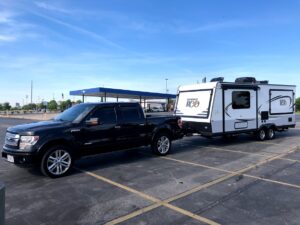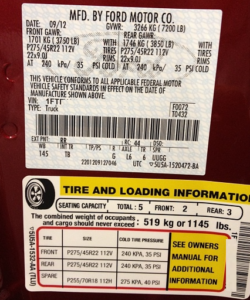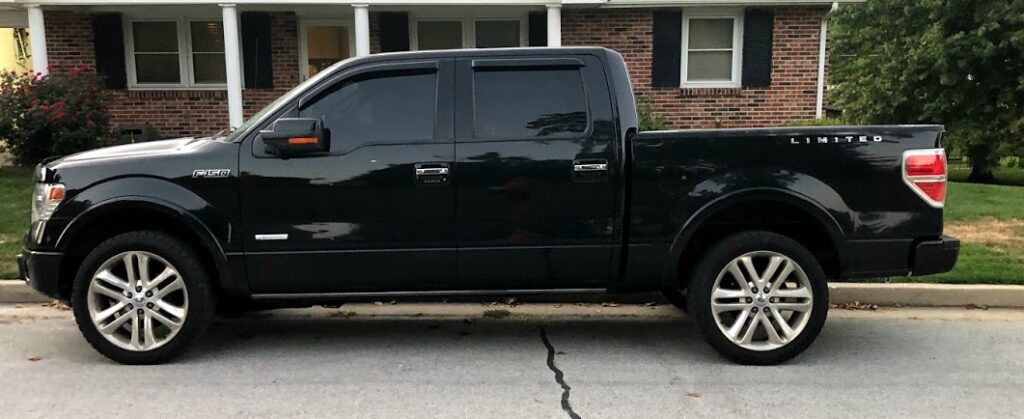Understanding your tow vehicle and what it can carry safely is a topic I am very passionate about. The amount of disinformation on this topic is shocking, and the ignorance (purposeful or accidental) from sales professionals can literally kill you.
Case in point. When Lindsey and I visited our first dealership we were greeted by a salesman that I believed to be very knowledgeable about his products and the world of RV’ing in general. We were very green and craved to be educated. I hung on his every word about the features and benefits of all the models on the lot. We were pumped and found the perfect floorplan, dreaming of vacations to come. Then, the bubble burst and I lost all confidence in our sales rep.
“What are you pulling with”, he asked. I told him our specific model of vehicle. A 2013 Ford F-150 Eco-boost Limited Super Crew. He immediately responded, “nice, you are rated to tow 11,000 lbs”. Now discrediting himself, we did not buy a trailer from this rep or dealership. I knew full well my exact truck was rated to tow just over 7,000 lbs.
Know what your vehicle can handle
 A lot goes into understanding your vehicles capacities and an alarming amount of disinformation exists to potentially put you and your family in a dangerous position. Had I believed the sales rep in the example above, he would not have batted an eye at selling me a 9,000 lb travel trailer which would have caused excessive wear on our truck at best, or caused a potentially fatal accident at worst.
A lot goes into understanding your vehicles capacities and an alarming amount of disinformation exists to potentially put you and your family in a dangerous position. Had I believed the sales rep in the example above, he would not have batted an eye at selling me a 9,000 lb travel trailer which would have caused excessive wear on our truck at best, or caused a potentially fatal accident at worst.
The sales rep was quoting what he likely learned from a commercial. Auto manufacturers love to list max tow ratings on ads, however, always include fine print. In the 2013 model year the only F-150 super crew with our motor that could handle 11,000 lbs would have been equipped with an optional 3.73 or 4.10 gear ratio and the heavy duty payload package. Neither were available on our Limited trim model. Finding a truck setup in this manner is difficult. Dealers often order half ton trucks with smaller gears and standard suspension for increased fuel efficiency and ride characteristics. A final note here on the rep, I truly do not feel he was being malicious. I have experienced the same scenario at auto dealerships as well. In reality most sales reps are not adequately trained.
The sticker is law
 All vehicles made within the last 20 years or so come off the assembly line with a very important sticker that will allow you to determine what you can safely tow. Before you buy any vehicle or RV, inspect this sticker to determine your capacities and compare it to what you are towing. Also, know that this sticker is literally law. If you exceed the weights outlined, you can be written up. If you wreck it, you open the door to a multitude of other issues in regards to liability for those involved.
All vehicles made within the last 20 years or so come off the assembly line with a very important sticker that will allow you to determine what you can safely tow. Before you buy any vehicle or RV, inspect this sticker to determine your capacities and compare it to what you are towing. Also, know that this sticker is literally law. If you exceed the weights outlined, you can be written up. If you wreck it, you open the door to a multitude of other issues in regards to liability for those involved.
Calculating your tow rating from most stickers can be a bit tricky at first with numerous acronyms and numbers scattered abound. See the chart at the bottom of the post for a quick reference or terms and calculations to help you on your way to safe towing.
The main focus point should be the GVWR (Gross Vehicle Weight Rating). This is the weight limit from the vehicle manufacturer, indicating the amount the vehicle can weigh fully loaded to operate safely. If exceeded, you are putting your tow vehicle, yourself, and others at risk.
Pictured is a Limited F-150 sticker similar to ours. The GVRW is 7,200 lbs and payload 1,145 lbs. Note, if the payload number is not on your sticker, you can figure it out by subtracting the vehicles curb weight from GVRW. Often, if a payload number is not disclosed, a curb weight and GVRW will be.
Right off the bat this sticker makes it clear that this not an ideal towing vehicle. The vehicle weighs 6,055 lbs (GVRW-Payload). The difference of 1,145 lbs in carrying capacity before maxing out the GVRW is quite low when you consider all that your truck will carry. To calculate payload you must consider occupants, cargo, and trailer tongue weight as well. Tongue weight can often be found on the side of your camper, however, it is a good idea to weigh your tongue loaded if you think you are close to your capacity. If you are doing some back of the napkin calculations, figure the tongue weight is 10 – 15% of your trailer weight to be safe.
Real World Example
Here is an example of how I calculated our load in our F-150 to determine how much I could haul in addition to the family and trailer. You can see why we had issues ultimately traded it in as we learned more about our limits.
- Payload = 1,145
- Tongue weight subtract 506 t0 759 for my 5,000 lb (dry) trailer
- Occupants subtract 530
- Leftover with the lightest tongue weight is 109 lbs!
- At worst tongue weight, overloaded by 144lbs
In short. No room for any luggage or cargo in the cab or bed.
In addition to these calculations you will also want to factor in what the manufacturer lists as the max trailer weight your vehicle can pull. A few ways to go about finding this. Try searching the VIN number on that same tag to decode on DecodeThis.com. You can search for the make/model/year towing guide online and find your vehicle based on your specs. If you have your original window sticker you will be able to find some of the more obscure details of your vehicle such as rear end gear ratios and heavy duty payload packages which helps. If in doubt, the service department at your dealer should be able to assist.
Recommendations
When it comes to matching a tow vehicle to a trailer, give yourself extra wiggle room so that you never get close to your max weight rating. I prefer to sit in the 75% zone or less of maxing out my vehicle. As in, only utilize up to 75% of my vehicles capacity. Our trailer loaded hits closer to the 650lb tongue weight mark. Add in around 700 lbs of people and gear and I am at about 1350 in payload assuming we keep luggage in the camper as normal. If I want to stay in my 75% zone, I need to look for something with around 1800 lbs in payload capacity if possible. This is an achievable number in many pickup trucks. Properly equipped full size SUV’s can get in the 1,700 – 1,800 lb range as well (Expedition, Suburban).
| GVWR | Gross Vehicle Weight Rating, the max weight of the loaded truck |
| GAWR | Gross Axle Weight Rating, the max weight on one axle of the truck |
| GCWR | Combined Weight Rating, the max weight of the truck and trailer combined |
| Tongue Weight | Weight of trailer at hitch point |
| Payload | Total weight of cargo, passengers, and tongue weight |

